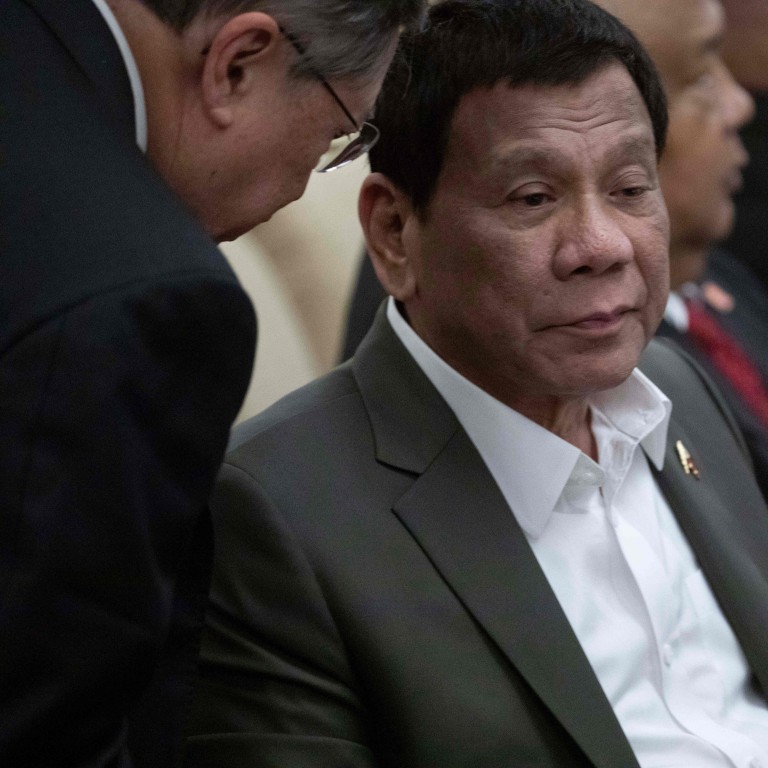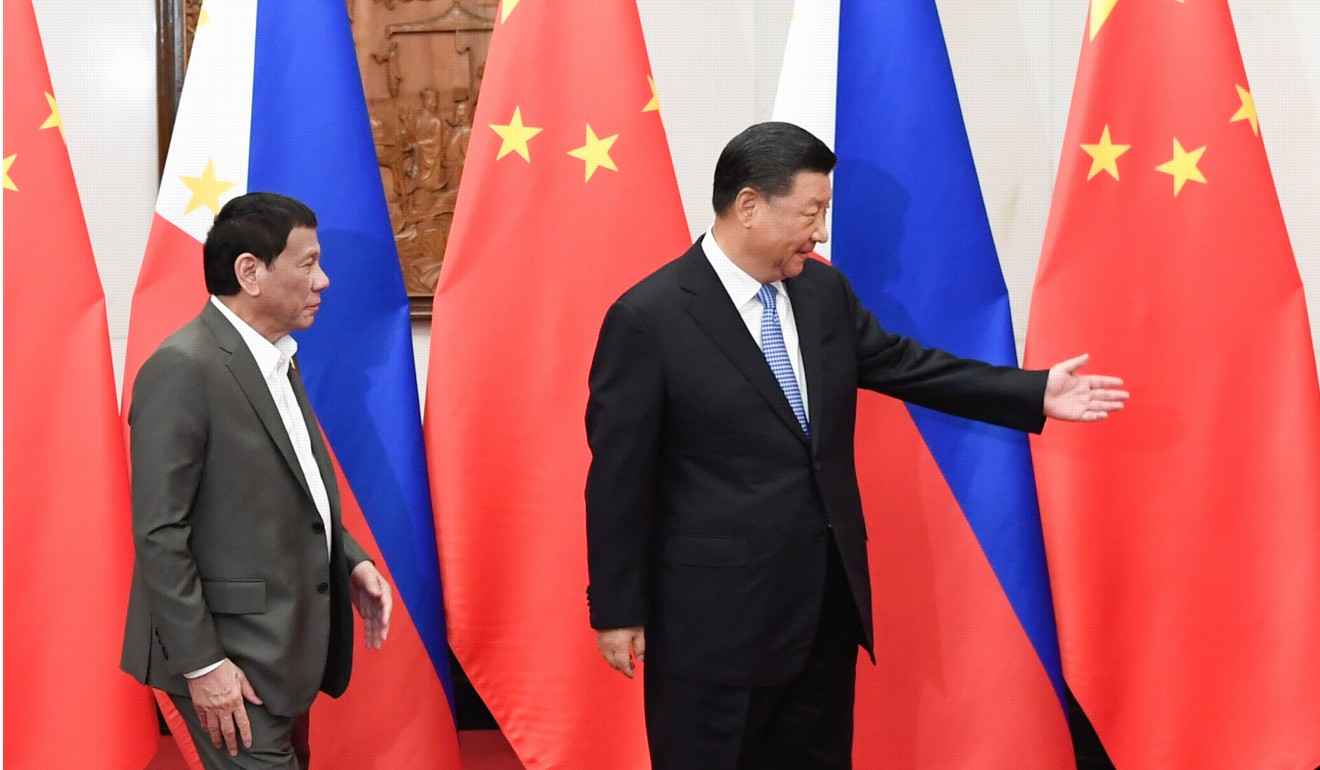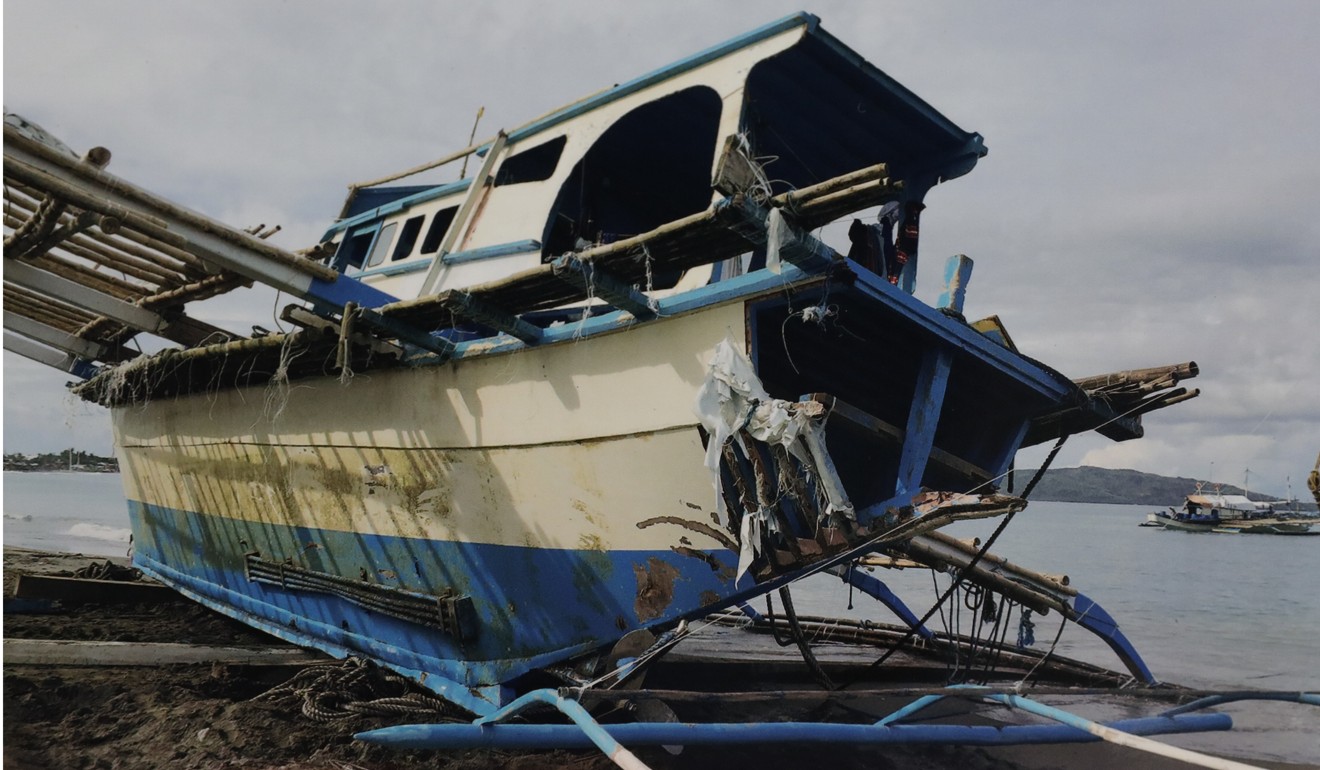
‘Ball is in Beijing’s court’ on South China Sea after Rodrigo Duterte puts focus on international law
- Philippine president raised contentious 2016 tribunal ruling with his Chinese counterpart in Beijing, but Xi Jinping said he would not accept it
- Observers say historically prickly issues are unlikely to get in the way of closer ties between the two nations
Duterte raised the contentious issue with Xi during a five-day visit to Beijing, as he faces mounting domestic pressure to take a tougher stand on China after a collision that sank a Filipino fishing vessel near the disputed Spratly Islands in June.
The two sides did agree to set up a steering group committee on joint exploration for oil and gas – which one analyst said was the best possible outcome given heightened tensions in the South China Sea – and inked cooperation agreements, including on higher education, science and technology, and a Chinese loan for a Philippine railway project.
As planned, Duterte raised the 2016 international tribunal ruling in favour of the Philippines, which undermined sweeping claims from Beijing to most of the South China Sea. But Xi said he would not accept the ruling, with the leaders agreeing to not let their conflicting positions get in the way of relations between the countries, Philippine presidential spokesman Salvador Panelo told reporters.

The strongman leader’s fifth visit to China in less than three years reflects his administration’s continued pivot to Beijing, which domestic critics have said comes at the cost of Manila’s sovereignty in the South China Sea. But observers said the historically prickly issues were not likely to get in the way of closer ties, even if Duterte shifted the focus to international law.
Jeffrey Ordaniel, assistant professor of international security studies at Tokyo International University, said he welcomed Duterte’s turn to the rule of law, after a policy of setting aside the United Nations Convention on the Law of the Sea that had not seen compromise from Beijing.
“While the meeting did not result in any concrete resolution of any outstanding issue, it did signal a change in the Filipino president’s approach – one that, from here on, is expected to increasingly emphasise the primacy of international law,” he said.
The establishment of the joint steering committee on oil and gas cooperation, and an accompanying working group, also signalled some progress after the memorandum of understanding signed in November for joint resources development. But observers cautioned that domestic concerns, as well as institutional and legal issues, remained hurdles for its implementation.
When Xi meets Duterte: is the China-Philippines honeymoon over?
Xue Chen, an assistant research fellow focused on maritime security at the Shanghai Institutes for International Studies, said Beijing would be patient in the process as it sought to keep the momentum going in relations with Manila. He noted that China was facing pushback not just from the Philippines but other stakeholders in the South China Sea.
“An agreement on joint energy development between China and the Philippines would not only be a pioneering effort, but one that would have a major impact on the future of the South China Sea,” he said. “Given this, the establishment of a steering committee is the best progress that can be made in the current situation in China-Philippines relations and in the South China Sea.”
Ordaniel said the Philippine constitution mandated that exploration and development of the country’s natural resources needed to “be under the full control and supervision of the state”, which was an issue for potential joint development in waters Manila claimed as its exclusive economic zone.
One option would be a service-contract mechanism governed under Philippine law, but it was unclear if Beijing would accept it, he said.
“I think Duterte has demonstrated his willingness to use his political capital back home to see a joint energy exploration deal between Manila and Beijing become a reality, but he cannot circumvent the law,” Ordaniel said. “The ball is really in China’s court. Is Beijing willing to compromise on its nine-dash line claim?”
The nine-dash line marks the extent of China’s claim to sovereignty over waters and islands that are also claimed by other nations, including the Philippines.
Explained: South China Sea dispute
In recent months, Beijing’s increasing aggression in the South China Sea has seen a number of tense incidents with rival claimants Vietnam and the Philippines, including the collision on June 9 between a Chinese ship and a Filipino fishing boat at Recto Bank near the Spratlys, which are claimed by both Manila and Beijing. The crew of 22 Filipinos was later rescued by a Vietnamese vessel.

During the leaders’ meeting, Xi also called for negotiations with the Association of Southeast Asian Nations (Asean) on a long-delayed code of conduct in the South China Sea to be concluded by 2021. But critics fear the document will not be legally binding and that its geographic coverage will reflect Chinese preferences, at the expense of Asean ones.
Hu Zhiyong, an associate research professor at the Shanghai Academy of Social Sciences and chairman of the China Maritime Research Alliance, said Beijing would continue to oppose the 2016 tribunal ruling, but would move to deepen economic ties with claimants to ease frictions over the South China Sea.
“China will increase the strength of its economic and trade cooperation with the Philippines, Vietnam, and other claimants to reduce their advocacy on the South China Sea issue,” he said. “China will also expand economic aid, and seek to promote bilateral relations by deepening ties in various areas and on different levels.”
Aaron Rabena, programme convenor at the Asia-Pacific Pathways to Progress in Manila, also said China would reject the ruling upfront and explicitly, given domestic audience considerations.
“But China can also comply with the ruling subtly and implicitly by refraining from prohibitive actions in, and militarisation of, the South China Sea,” he said.

